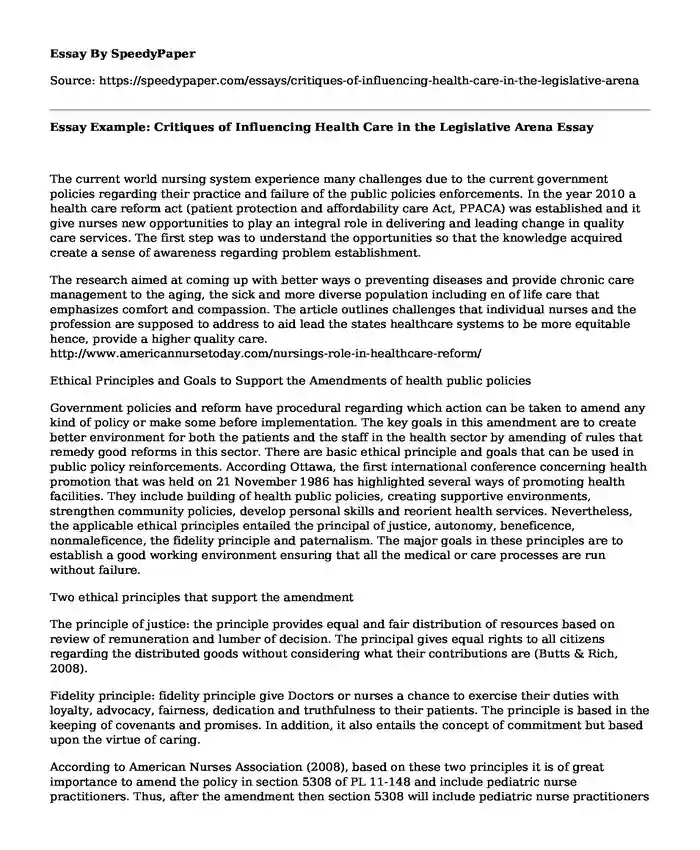
| Type of paper: | Essay |
| Categories: | Policy Health and Social Care Nursing Ethics |
| Pages: | 3 |
| Wordcount: | 706 words |
The current world nursing system experience many challenges due to the current government policies regarding their practice and failure of the public policies enforcements. In the year 2010 a health care reform act (patient protection and affordability care Act, PPACA) was established and it give nurses new opportunities to play an integral role in delivering and leading change in quality care services. The first step was to understand the opportunities so that the knowledge acquired create a sense of awareness regarding problem establishment.
The research aimed at coming up with better ways o preventing diseases and provide chronic care management to the aging, the sick and more diverse population including en of life care that emphasizes comfort and compassion. The article outlines challenges that individual nurses and the profession are supposed to address to aid lead the states healthcare systems to be more equitable hence, provide a higher quality care. http://www.americannursetoday.com/nursings-role-in-healthcare-reform/
Ethical Principles and Goals to Support the Amendments of health public policies
Government policies and reform have procedural regarding which action can be taken to amend any kind of policy or make some before implementation. The key goals in this amendment are to create better environment for both the patients and the staff in the health sector by amending of rules that remedy good reforms in this sector. There are basic ethical principle and goals that can be used in public policy reinforcements. According Ottawa, the first international conference concerning health promotion that was held on 21 November 1986 has highlighted several ways of promoting health facilities. They include building of health public policies, creating supportive environments, strengthen community policies, develop personal skills and reorient health services. Nevertheless, the applicable ethical principles entailed the principal of justice, autonomy, beneficence, nonmaleficence, the fidelity principle and paternalism. The major goals in these principles are to establish a good working environment ensuring that all the medical or care processes are run without failure.
Two ethical principles that support the amendment
The principle of justice: the principle provides equal and fair distribution of resources based on review of remuneration and lumber of decision. The principal gives equal rights to all citizens regarding the distributed goods without considering what their contributions are (Butts & Rich, 2008).
Fidelity principle: fidelity principle give Doctors or nurses a chance to exercise their duties with loyalty, advocacy, fairness, dedication and truthfulness to their patients. The principle is based in the keeping of covenants and promises. In addition, it also entails the concept of commitment but based upon the virtue of caring.
According to American Nurses Association (2008), based on these two principles it is of great importance to amend the policy in section 5308 of PL 11-148 and include pediatric nurse practitioners. Thus, after the amendment then section 5308 will include pediatric nurse practitioners and give them more power to perform care services based on the principles provided.
Defenses to malpractice and risk management techniques
In case of malpractice one might be sued either guilty or not for interrogation. During interrogation there are tools used for discovery pretrial process by which plaintiff defendant gets facts and information concerning the case from each other and conduct investigation for full facts establishments. To manage the risk involved in treatment of documents are forwarded and legal documentation. One has to be candid and honest with his or her defense attorney and the claim representative. Al the information regarding to questions are supposed to be answered by the representative. Summons regarding complainant are done via direct connection to a judge.
The Legal Implications of Acceptance or Refusal of an Assignment
Legal implication refer to application of law in cases of malpractice. Use of attorney to ions since he/or shop answer quest quotations. Legal implication makes one to prepare for affidavit testimony. It is necessary to put in order and analyze the testimony with the security notary. The plaintiff's legal representative will be reviewing your set down testimony for any irregularity in witness, thus, preparation and honesty is essential for a successful deposition.
References
Beauchamp, T. L., & Childress, J. F. (2009). Principles of biomedical ethics (6th ed., pp. 38-39). New York, NY: Oxford University Press.
American Nurses Association. (2008). Nursing Informatics: Scope and standards of practice. Washington, D.C.: Author.
Cite this page
Essay Example: Critiques of Influencing Health Care in the Legislative Arena. (2019, May 15). Retrieved from https://speedypaper.net/essays/critiques-of-influencing-health-care-in-the-legislative-arena
Request Removal
If you are the original author of this essay and no longer wish to have it published on the SpeedyPaper website, please click below to request its removal:
- Essay Sample on The Freedom of Life
- Identity Theft - Free Essay Example
- Literary Essay Sample: Yemen Chronicles Research
- Effects of Social Media - Free Essay for Students
- The Radicalism of the American Revolution: A Critical Review Essay Sample
- Paper Example on Engaging the Private Sector to Promote Homeland Security
- Free Essay Comprising the Christmas Movie Review: Miracle on 34th Street
Popular categories




